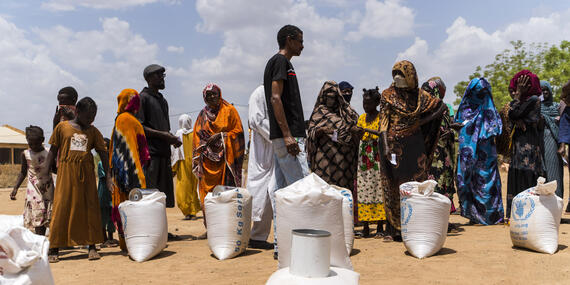Today's top news: Sudan, Occupied Palestinian Territory, Nigeria

Sudan
Acting Under-Secretary-General for Humanitarian Affairs, Joyce Msuya, said immediate humanitarian access is vital to delivering life-saving aid in Sudan, stressing that the confirmation of famine in North Darfur state is a sobering reminder of our shared responsibility.
The IPC Famine Review Committee reported yesterday that the ongoing conflict in Sudan has pushed communities in North Darfur State into famine, notably the Zamzam camp near the state capital Al Fasher.
In a statement, the Humanitarian Coordinator in Sudan, Clementine Nkweta-Salami, stressed that to stop a large-scale famine from taking hold in the country, donors must urgently scale up their financial support while using diplomacy to push for opening up humanitarian access.
She said the humanitarian community in Sudan has been scaling up the response in recent months, but the needs are immense and there isn’t a moment to waste.
More than half of Sudan’s population – some 25.6 million people – is facing acute hunger.
Clementine Nkweta-Salami called for a silencing of the guns to enable safe and unimpeded humanitarian access across borders and battle lines – as well as an urgent injection of funding for aid operations.
As of today, this year’s US$2.7 billion humanitarian response plan for Sudan is less than a third funded, with $872 million received.
Occupied Palestinian Territory
UN agencies warn that there’s a high risk of the further spread of infectious diseases across the Gaza Strip, amid chronic water scarcity and no way to adequately manage waste and sewage.
The UN Relief and Works Agency for Palestine Refugees in the Near East has reported nearly 40,000 cases of Hepatitis A in its shelters and health centres since October.
Meanwhile, health partners are preparing for the worst-case scenario of a polio outbreak.
The World Health Organization (WHO) said earlier this week that efforts are ongoing to acquire vaccines. However, as with food and medical supplies, it is not enough just to get them across the border. WHO called for a ceasefire and at the very least, clear roads and safe access to allow partners to reach each and every person in Gaza with the necessary vaccinations.
Meanwhile, OCHA reports ongoing impediments to humanitarian access in Gaza, including continued hostilities, unexploded ordnance, damaged and impassable roads, attacks on aid convoys, a lack of public order and safety, the closure of the Rafah Crossing, and restrictions imposed by Israeli authorities on the entry of certain humanitarian supplies. These factors continue to significantly hinder the entry of aid into Gaza and the delivery of aid and basic services to hundreds of thousands of people across the Strip.
OCHA says that out of 157 aid missions planned to northern Gaza last month, just 67 were facilitated by the Israeli authorities. The rest were either denied, impeded or canceled due to security, logistical or operational reasons.
Nigeria
The acting Humanitarian Coordinator in Nigeria, Cristian Munduate – who is also the UNICEF representative in the country – said she was saddened by the latest attack in Borno State in the north-east of the country. Munduate offered condolences and wished those injured a speedy recovery.
The attack, which took place on 31 July in Kawuri, in Konduga locality south-east of Borno’s capital Maiduguri, is the latest in the span of a month.
On 29 June, dozens of people were killed, and many others were injured, in a series of suicide bomb attacks in Gwoza, also in Borno.
